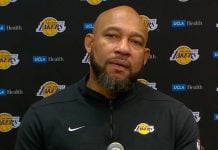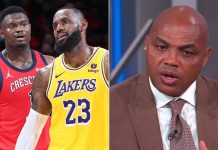As the inaugural GLOBAL SPORTS TECH YOUTH CHALLENGE, Tarik Black Foundation’s annual Multicultural Event, is ready to kick off, TalkBasket.net caught up with Judith Black-Moore, the woman behind the project.
Judith Black-Moore is the president and co-founder of the Tarik Black Foundation, an entity that aims to prepare the youth for the challenges of adult life.
Moore, mother of former Lakers center Tarik Black, helped launch the Foundation in 2017 fulfilling a commitment she made to her son, even before he signed his first NBA contract. Over the course of six years, the Memphis-born athlete did not only play in the world’s top league, but got to see the world outside the USA for one year and a half as a starting center for Maccabi Tel Aviv in Israel. Of course, he is still the founder and chief executive officer of the Foundation under his name.
An event for Memphis and Israeli youth
The upcoming (November 23-25) GLOBAL SPORTS TECH YOUTH CHALLENGE is a global sport tech development challenge for teens in Memphis and Tel Aviv. Memphis tech teams compete with their Tel Aviv counterparts in a sports tech innovation event.
Teenagers from the two cities will address social and business entrepreneurship challenges. Each team will comprise of up to five children. This virtual event for students aged 11-19 will assemble five teams in Memphis and as many in Tel Aviv, challenging each other to build businesses that bring together sports and technology. Students will participate in workshops on business modeling, prototyping, and pitching.
Each team will be scored by a panel of four judges, with winning teams being awarded prizes. However, the two winning teams will be given the opportunity to present their winning concepts at the International Sports Tech Nation Summit, held in Tel Aviv every year. This year it will take place on December 7. Children will get to meet global investors and people in the sport industry from around the world. Students will also engage in a number of cultural exchanges and learn about social issues in their respective countries.
In case one is not familiar with the term “sports technology”, Judith Black Moore is ready to provide a definition and one of the most recent examples: “Anything from the game board to performance technology which measures how well an athlete performs; even the fan experience itself. For instance, the NBA bubble used technology in play that gave players the feel that there were people in the stands. Everything now has a technical component. Our keynote speaker is the founder of PlayVision, which is an app that analyzes the performance of a player.”
There is a Tarik Black program called “From Israel to Memphis multicultural celebration”. In this regard, Israel was chosen because Tarik played for Maccabi Tel Aviv for two years. Maccabi’s Chief Technology Officer will also mentor challengers.
“Tarik played in Israel until the pandemic ended the season. When we started the Foundation in 2017, we would definitely do programming in Memphis and in any city that Tarik plays. So, we had activities in Los Angeles, in Houston and this event is part of the commitment to impact those cities”, Moore says.

The initiative is based on global awareness, wealth creation, technology and healthy habits. However, Tarik’s role in the event will be limited this year because of fatherhood. The newest addition to the Black family, Kiya Naomi Black, was born on Saturday, November 14, in Dallas, where he currently resides. As chance would have it, just one day prior to the event, the former Memphis and Kansas standout celebrates his 29th birthday.
“He hasn’t been part of the planning to this point, but because of him we have a relationship with Colosseum Sport, Google Tel Aviv and other parties. His vision towards the Foundation has brought in some of the relationships that he built while in Israel in order to benefit our program. We have talked a lot long distance and in the off-season. He’s around to provide input because he’s very good in articulating his vision. Our model is to work with other dynamic people and organizations to create unique programs that have some impact on the next generations of sports entrepreneurs.”
Future will be the keyword also in the Foundations’ name. Black-Moore explains how Taking Back the Future came to the forefront as the new trademark: “That’s the name we’re moving towards. TBF is the acronym for Tarik Black Foundation. So, we were trying to come up with a meaningful name, but also when you look at it, the writing (TBF) is very much like Tarik Black. Now, with the pandemic, this logo means so much more to people who feel that the future has gotten away from them. Personally, I didn’t enjoy the grandparenting experience because of the distance from my grandchildren. My mother is in long-term care and I haven’t seen her since March. We will have to figure out a way to make up for the lost time.”

“Tarik is ready to play”
Amidst the 2019-20 campaign, the 29-year-old center parted ways with Maccabi to join his family in the States. Although he hasn’t signed with any team since then, Judith confirms that he’s willing to resume his career as soon as possible: “He’s ready to play and he’s been training. Free agency has started on November 20 and he would like to return to the NBA. To my knowledge, he’s not ruling out overseas options.”
Tarik Black moved from Memphis to Kansas in 2013, where he obtained his Masters degree three years later, while playing with the Lakers. Managing the Foundation and being away from her son for many years has been difficult at times, but Judith is positive that he will return to his hometown sooner or later. There is also another thing: Tarik Black has stated that by family, he means people of Memphis and not just his parents and siblings. Does this mean he’s going to return there at some point or even run for mayor? “I have heard that”, Judith replies after a short chuckle. “Time will tell. Memphis is home.”
Before joining the Lakers or even considering whether to pursue a hoop career, the young student got a glimpse of his own future. At age 15, it was a professional athlete that transformed his way of thinking about what success should mean. During an award acceptance speech, Tarik listened to former NBA player, Magic Johnson talk about using his NBA platform to serve humanity. It was at that moment he understood the power of professional athletes to influence young lives.
”Magic spoke and made a comment about how he was called for something more and bigger than basketball. Tarik was 15-16 and after the event he told me that he wanted to give back to young people and his hometown”, his mother recalls.
“So, the vision had started probably 5 years before 2017. He said: “I want basketball to be the hook to bring young people in, but I don’t want it to be focused on basketball. Players should recognize that they are more than that.” All of our programs throughout the years have focused on ways of building character. Our idea is to give kids real world experience, so that they are ready for the future”, she further adds.
A world traveler
Spending some time overseas turned out to be beneficial for the Black family. Not just for the main person involved, but also for his visiting mother who joined him on at least one occasion.
“He had the opportunity to play in so many different kinds of settings. At first, we were traveling around the country, which was eye-opening. But when he started traveling around the world, that changed his way of thinking. When you see a country for 15 seconds on a news report, your perspective is very narrow. Him going to Israel gave me the opportunity to travel there and my entire perspective of the country changed. I stayed there for five days, not necessarily as a tourist. We went to different countries and games. We stayed in Turkey for three days and then went to the Canary Islands in Spain. I’m so glad I made that journey”, Judith acknowledges.
As far as the basketball experience goes, Judith came to realize that in Europe “there is a different fanbase and energy in the game, in the way people cheer for the game. I imagine that for players who are in countries that don’t speak English at all, it will be an opportunity to learn a language or a way of thinking. You learn acceptance, to appreciate the other culture. Israel was where three major religions began. The NBA obviously is the pinnacle, but when it comes to life’s experience, being away gives you a broader point of view. Tarik was all over Europe and visited many countries. Because of this program, I had the opportunity to reach out to the Jewish community, so that we could take our programs to another level.”
Judith used to be marketing director at the National Civil Rights Museum in Memphis. Learning that her son decided to pick up a Masters program in African-American Studies at Kansas made her “very pleased. My father was an historian and made sure we all in the family knew history. I think that choosing African-American history was eye-opening for him and as he matured and got older, it has helped him with inter-cultural relationships.”
Choosing the basketball over the trumpet
Coming to terms with the realization that Tarik was not going to play the trumpet (the instrument he came to master at an early age in Middle School), but take up hooping instead looked like a bitter pill to swallow: “I didn’t come to terms right away”, Black-Moore admits.
If it hadn’t been for Tarik’s basketball prowess, his career could have taken a different path. Combining music and sports was a tricky task since the schedule didn’t provide much help.
“Because he started playing basketball so well, I accepted it. I wanted him to do both, but the school system wasn’t set up for him to be able to do that. He had to make a choice. The band was practising somewhere around the same time that basketball practices were taking place. Tarik told me that he felt like he wanted to play basketball because he hadn’t made his Middle-School team and wanted to try out again.”
However, it seems that the ex-Laker never really gave up on his other vocation: “In his first year in the NBA, he participated in the All-Star Challenge and actually played the trumpet in the talent competition. He came in third out of ten. A friend of his gave him a very nice trumpet for his 25th birthday and every once in a while he would pull it out. Now that he has kids, I’d say he will pull it out even more.”
Tarik has described his father Lawrence as a “freak athlete”, creating a strong contrast with his mother who “never really cared about sports”. Judith vehemently denies her son’s claims.
“I was very education-focused. I wanted Tarik to get his education and when he was at AAU camps, I made a deal with him”, she remembers.
“There was a science camp at the Centers for Disease Control in Atlanta that I wanted him to go to. Then, it turns out he signed off from that camp and received an invitation to join the NBA’s Top 100 High School basketball players camp. I was adamant in him going and we had a quarrel. In the end, we compromised. The basketball camp finished on Saturday and we drove back to Atlanta for him to attend the science camp. He may not understand why I forced him to do that, but he surely appreciates that I did. It was a meaningful experience because it allowed him to be more than a basketball player. I understood that sports was what he wanted to do and I would go along with that, but I wanted to make sure he got his education. I think the reason he finished his Masters was me wanting to instill in him the importance of education.”

Kobe, the financial counselor
Sports can provide a springboard to gaining valuable knowledge and insight. In that respect, sitting next to Kobe Bryant was also meaningful for Tarik, since the now deceased Lakers legend handed out free lessons on financial literacy to his teammate at the time.
“He told me about times they would go to dinner or lunch together”, Judith recounts.
“When Tarik became a Laker, he reached out to Kobe and asked him if he would mentor him – not about basketball, but life off the court: how to manage finance, family, fame etc. Kobe spent quite some time with him and called him his little brother. Kobe probably called a lot of people like that, but they really talked a lot about life beyond basketball.”

















